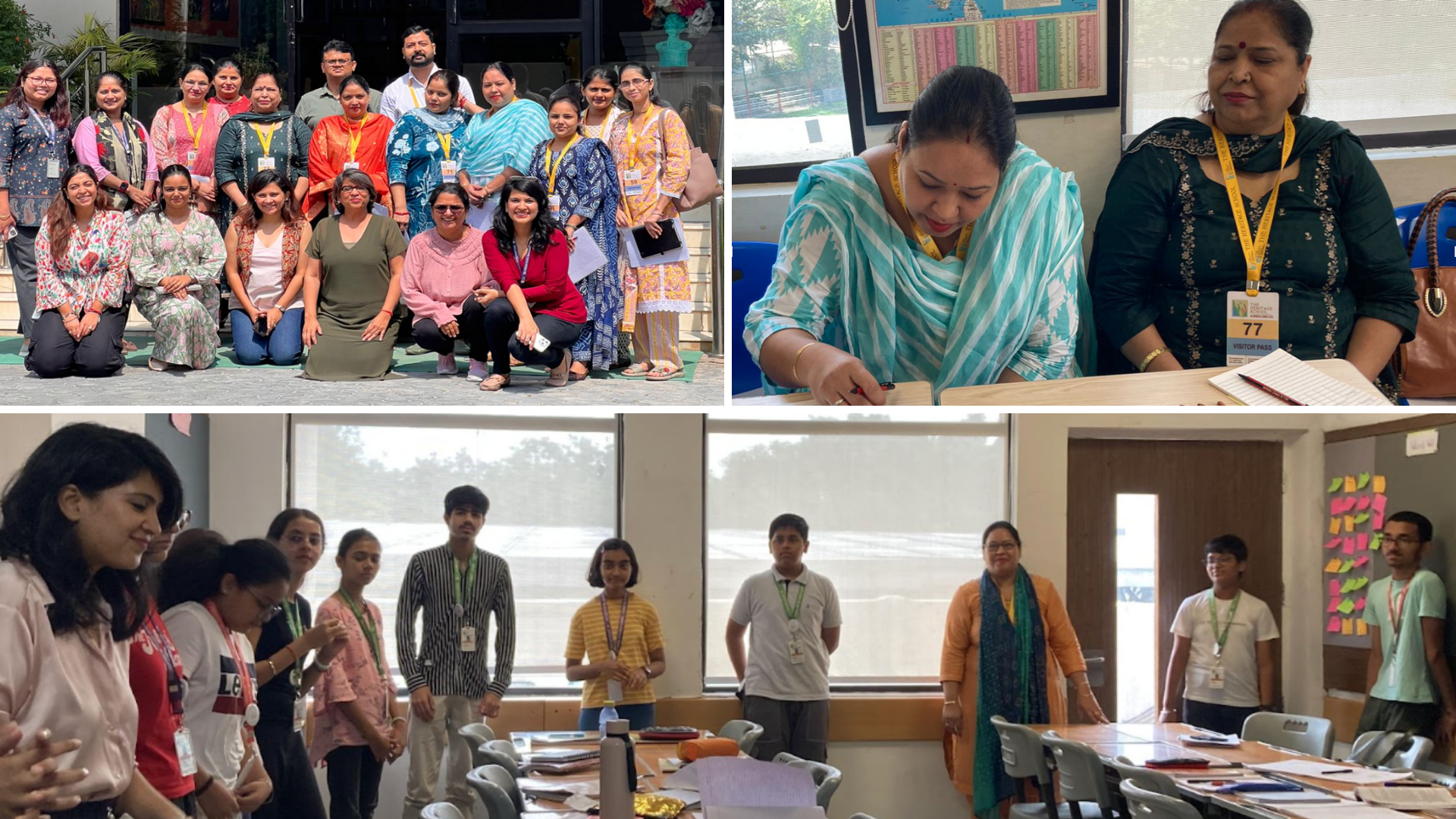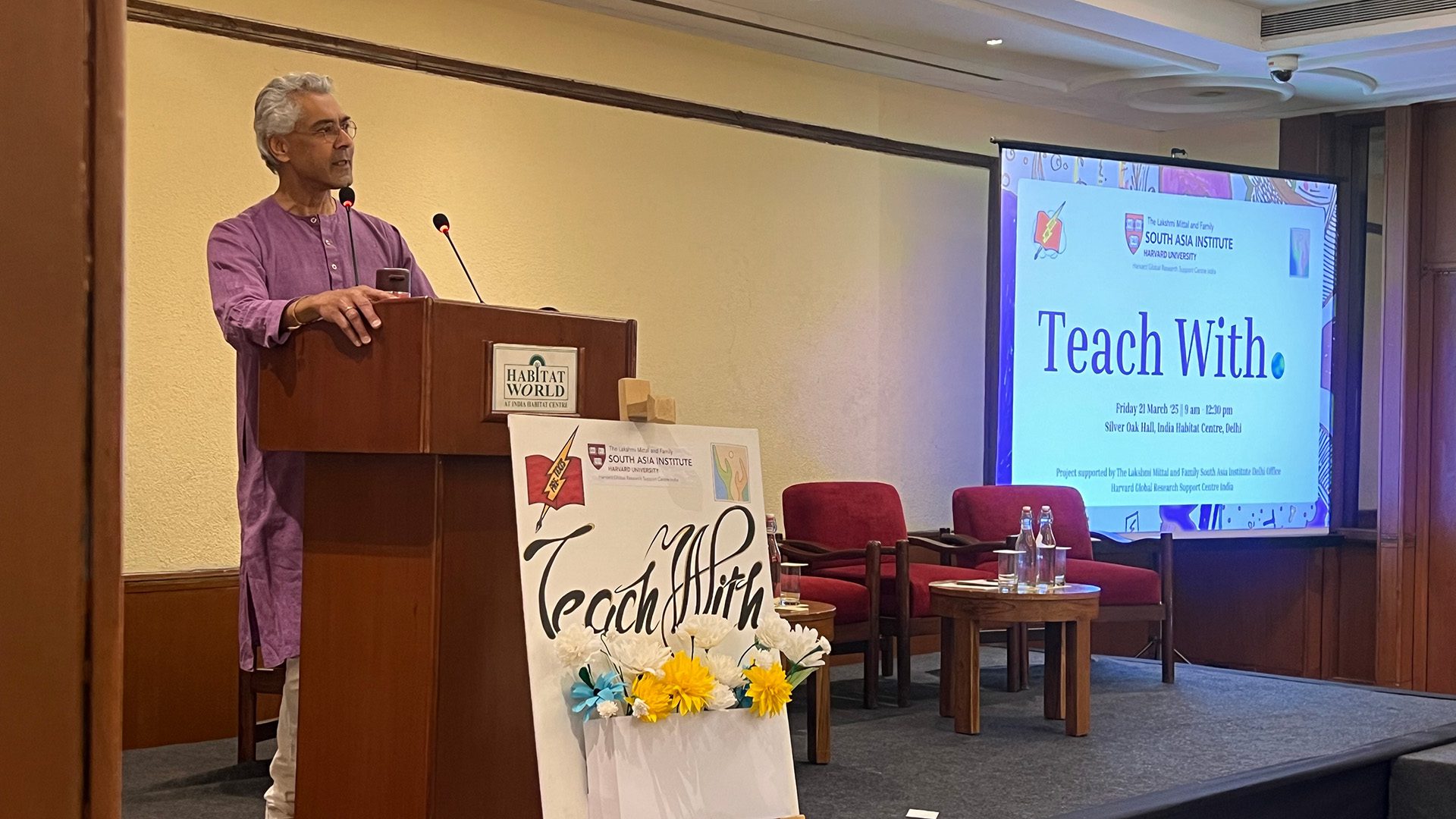Pre-Texts is an arts-based training program that promotes literacy, critical thinking, and citizenship by having students interpret teaching through creative expression. Developed by Harvard’s Professor Doris Sommer, Mittal Institute steering committee member and the Ira and Jewell Williams Professor of Romance Languages and Literatures and of African and African American Studies at Harvard University, it’s now active in South Asia, aligning with India’s mandate for arts-integrated education and helping teachers put policy into practice.
We last spoke to Prof. Sommer in 2022 about the program, and it has since expanded across New Delhi. This year alone, the program has partnered with new academic institutions like the The Heritage School, Vasant Kunj, New Delhi (THSVK), where it has trained 23 teachers in the pedagogy of the program. Pre-Texts also trained eight volunteers from Sarvam Shakti, an NGO dedicated to empowering marginalized girls, further expanding the program’s collaboration.
We spoke to Prof. Sommer for an update on the program, and where she hopes to take it in the future.
Mittal Institute: Doris, when we last spoke, the Pre-Texts program was based at FLAME University in Pune. Since then, you’ve expanded to schools across New Delhi. What has that expansion looked like, and who has been involved?
Doris Sommer: Over the past two academic years, Pre-Texts as a pedagogy and teaching method has taken root and flourished in the classrooms of The Heritage School, Vasant Kunj (THSVK). In 2024, with support from the Delhi Office of the Lakshmi Mittal and Family South Asia Institute, teachers from THSVK—whom I personally trained—served as facilitators and conducted training sessions for nearly 60 educators across schools in New Delhi, Haryana, Uttar Pradesh, and Rajasthan. In addition, we partnered with Sarvam Shakti, a distinctive grassroots initiative by the Sarvam Foundation that works to empower marginalized girls. Since January 2025, volunteers from Sarvam Shakti have been implementing Pre-Texts in their community programs.

Offline teacher training at The Heritage School, Vasant Kunj.
Mittal Institute: Pre-Texts has always emphasized training local educators in innovative teaching and pedagogy. How has this training evolved as the program has expanded?
Doris Sommer: Advancements in technology have enabled us to connect with an increasing number of educators. Our training is conducted in two phases: the first is an in-person observation of Pre-Texts in action across various grades and subjects at THSVK. This is followed by a comprehensive 15-hour online training, where participants engage with the pedagogy through multiple texts. As part of the training, teachers also conduct sessions for both facilitators and peers, deepening their understanding through practice. This blended approach not only familiarizes educators with the Pre-Texts protocols but also encourages them to reflect on how to integrate the method into their own classrooms and subject areas. Our broader goal is to foster a self-sustaining community of practitioners who continue to collaborate, adapt, and innovate using Pre-Texts.
Our broader goal is to foster a self-sustaining community of practitioners who continue to collaborate, adapt, and innovate using Pre-Texts.

An example of an online teacher training session: Teachers from Rajasthan are trained by the facilitators.
Mittal Institute: Originally focused on arts-based learning for literacy and comprehension, Pre-Texts has since broadened its scope to include topics like climate change and mental health. What drove this shift, and how are these new themes being integrated?
Doris Sommer: Through the practice of Pre-Texts, educators realized that the pedagogy has no limits, and it could be practiced across various academic and non-academic topics. It is only when we connect real-life experiences to the curriculum across grades that both students and mentors can fully engage and find meaningful relevance. By design, the Pre-Texts pedagogy encourages learners to move beyond the boundaries of the assigned reading, prompting them to think critically, explore tangents, and conduct research that extends far beyond the text itself.
Pre-Texts pedagogy is being actively applied not only in subjects like Political Science, History, Economics, and Geography, but also in Mathematics and the Sciences. In science classrooms, integrating reading with lab work has not only supported students in preparing for exams, but also sparked their curiosity and encouraged independent research beyond the syllabus. One of the strengths of Pre-Texts is its ability to naturally weave in real-world issues—such as climate change, discrimination, public health crises, technology and privacy concerns, and the safe use of digital tools—making learning both relevant and deeply engaging.


Pre-Texts in classrooms across India.
Mittal Institute: On the topic of climate, you recently participated in an event in New Delhi—co-sponsored by the Mittal Institute—that addressed the effects of climate change. Could you tell us more about the event and how it aligns with Pre-Texts’ mission?
Doris Sommer: On March 21, at the India Habitat Centre, we hosted an “unconference” as a part of our initiative Teach With 🌏. Educators from across the country gathered for a special event that showcased the Pre-Texts protocol and celebrated the contributions of trainers, teachers, and schools who helped bring the pedagogy into their classrooms. Led by students from The Heritage School, the event began with a moving climate-themed song written and composed by the learners themselves, followed by vibrant student-led anchoring and a panel discussion featuring school leaders engaged with Pre-Texts. Attendees also participated in a live demonstration of the Pre-Texts methodology, using a text on climate inaction—an experience thoughtfully aligned with the concurrent climate conference organized by Harvard University. Given the urgency of climate change and societal inaction, the conversation was timely and deeply relevant.
Hitesh Hathi, Executive Director of The Lakshmi Mittal and Family South Asia Institute, also addressed the audience, underscoring the vital role of quality education in shaping meaningful change. This “unconference” aimed not only to highlight the growing impact of Pre-Texts in Indian classrooms, but also to inspire attendees to explore its potential in their own educational settings.

Doris Sommer, second from right, at the “unconference”.

Hitesh Hathi, Executive Director of the Mittal Institute, speaks at the “unconference”.
Mittal Institute: Looking back at the program’s growth, what achievements or moments are you most proud of?
Doris Sommer: The journey of practicing, training, and implementing Pre-Texts in India has been both transformative and deeply rewarding. What we’re most proud of is the real-time change it fosters—not only within classrooms but also in the mindset of educators and learners, encouraging them to seek knowledge beyond the text. Pre-Texts training is dynamic and engaging, cultivating a vibrant learning environment for educators—one that naturally extends into their teaching and energizes their classrooms.
We have been able to take Pre-Texts to the grassroots, through schools like New Bal Bhavan Model School in New Delhi, working with children from the marginalized communities and Sarvam Shakti, an NGO which works with girls from the government schools as a part of an afterschool program teaching them skills around literacy, communication, arts, technology etc. Witnessing the impact that Pre-Texts has made in these spaces reinforces our sense of purpose and fuels our determination to bring this transformative pedagogy to every classroom across the country.
Mittal Institute: And finally, where do you see the Pre-Texts program headed in the coming years?
Doris Sommer: In the coming years, under the Teach With 🌏 initiative, our goal is to foster a collaborative environment where educators from diverse regions come together to co-create joyful, engaging, and empowering classroom experiences. We envision classrooms where learners take ownership of their learning, and where autonomy and curiosity are at the heart of education. With a commitment to equity, we strive to ensure that no child is left behind, by recognizing and nurturing the unique abilities of every learner.
This year, our focus is on expanding the initiative within government institutions by establishing nodal schools that will serve as training hubs for surrounding schools. We aim to train nearly 200 teachers across multiple states, host live demonstrations of Pre-Texts across India, and build a vibrant, self-sustaining community of educators dedicated to transformative teaching and learning.
☆ The views represented herein are those of the interview subjects and do not necessarily reflect the views of the Mittal Institute, its staff, or its Steering Committee.
